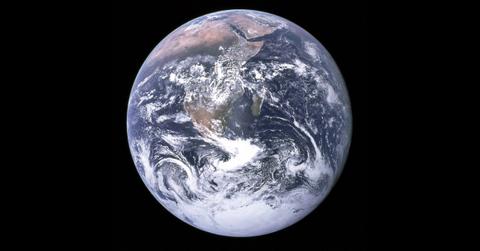'We're Living a Lie': Astronaut Reveals Shock Realization After Viewing Earth from Space

The ‘overview effect’ is caused by the sight of Earth from space.
Former NASA astronaut Ron Garan returned to Earth after spending 178 days in space with a profoundly changed worldview.
Knewz.com reported that Garan now believes many of the planet's issues could be addressed if more people experienced what scientists call the "overview effect."
Garan, who traveled more than 71 million miles in a total of 2,842 orbits, realized that Earth is more fragile than he initially thought. "When I looked out the window of the International Space Station, I saw the paparazzi-like flashes of lightning storms, I saw dancing curtains of auroras that seemed so close it was as if we could reach out and touch them," he recounted.
"And I saw the unbelievable thinness of our planet's atmosphere. In that moment, I was hit with the sobering realization that this paper-thin layer keeps every living thing on our planet alive," he continued. "I saw an iridescent biosphere teeming with life. I didn't see the economy. But since our human-made systems treat everything, including the very life-support systems of our planet, as the wholly owned subsidiary of the global economy, it's obvious from the vantage point of space that we're living a lie."
This new perspective has led Garan to believe that humanity needs to rethink its priorities. "We need to move from thinking economy, society, planet to planet, society, economy. That's when we're going to continue our evolutionary process," he stated.
He emphasized that the world is paying a "high price" for humanity’s flawed perspective, which is evident in our failure to address global problems.
- What Lies Beneath: NASA Scientist Believes Aliens May Have Found 'Perfect' Hiding Spot in Earth's Oceans
- Global Threat: Russia Insider Warns West of 'World War Using Nuclear Weapons' Amid Escalating Support for Ukraine
- Countdown to Disaster? Ex-NATO Official Warns Russia, Iran and China Could Wage WWIII in Just Years
"We're not going to have peace on Earth until we recognize the basic fact of the interrelated structure of all reality," Garan noted in a video posted to Big Think.
Garan is not alone in experiencing this change of perspective. William Shatner, best known for his role as James T. Kirk in the Star Trek series, noted after his visit to space, "It was among the strongest feelings of grief I have ever encountered." He described the contrast between the "vicious coldness of space and the warm nurturing of Earth below" as overwhelming and filled with sadness.
Never miss a story — sign up for the Front Page Detectives newsletter. Be on the scene the moment news breaks.
"Every day, we are confronted with the knowledge of further destruction of Earth at our hands: the extinction of animal species, of flora and fauna… things that took five billion years to evolve, and suddenly we will never see them again because of the interference of mankind," Shatner lamented.
Edgar Mitchell, the sixth man to walk on the moon, also experienced the "overview effect." He said, "There was a startling recognition that the nature of the universe was not as I had been taught… I not only saw the connectedness, I felt it.… I was overwhelmed with the sensation of physically and mentally extending out into the cosmos." Mitchell realized this was a biological response of his brain attempting to reorganize and give meaning to the awe-inspiring processes he was privileged to view.
Become a Front Page Detective
Sign up to receive breaking
Front Page Detectives
news and exclusive investigations.
